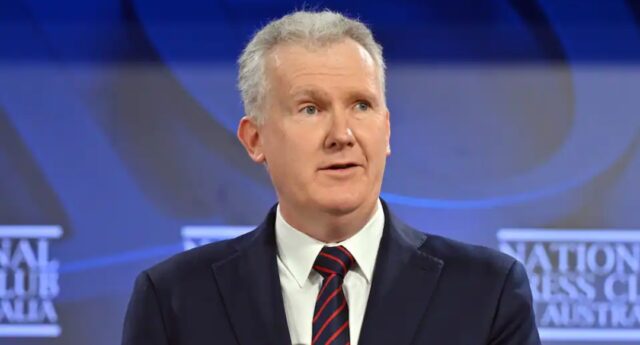A senior Labor minister has acknowledged new laws protecting gig economy workers may lead to higher prices but justified the move, declaring “slavery is cheaper”.
Employment and Workplace Relations Minister Tony Burke has revealed Labor will introduce greater protections in the gig economy, including for delivery riders working for apps like Uber, when parliament sits on Monday.
Speaking to the National Press Club on Thursday, Burke confirmed his party would also move to outlaw wage theft and ensure people stuck in long-term casual work received annual leave and sick pay.
He responded to concerns the laws could see consumers pay more for items they order to their door, saying: “underpaying people is cheaper”.
“Slavery is probably cheaper, too,” he said.
“We’re talking about some of the lowest-paid people in Australia. If that means there’s a tiny bit extra you pay when your pizza arrives at your door, and they’re more likely to be safe on the roads getting there, then I reckon it’s a pretty small price to pay.”

In 2020, NSW announced a task force to investigate the gig economy after a spate of five deaths in just two months. At least 13 delivery riders have died across the country in recent years.
Burke said low pay was directly linked to the deaths, with desperate workers taking risks to complete jobs quickly and ensure they were available for extra work.
“Running red lights, going up onto the footpath, down onto the road … creating an extra lane between the parked cars and the traffic,” he said.

“[They know] at any moment, if a car door opens, instead of riding between the lines, they’ll be lying beneath the traffic … closing these loopholes will change their lives.”
Labor is also pushing to increase protections for migrant workers after multiple reports found widespread exploitation among that group. Burke conceded that protecting new arrivals, who were more likely to work in the gig economy, would “take some time for us to get on top of”.
“People who are exploited are disproportionately here in Australia as our guests,” he said.
“There is a cruel, deliberate, and menacing project out there from some to exploit people on the basis that you can’t just threaten to fire them, you can threaten to deport them,” he said.
Wage theft to be criminalised, expansion of rights for casuals
The changes will also make wage theft a criminal offence.
“It is, and should be, a criminal offence for the worker to be taking money from the till,” Burke said.
“But it is not a criminal offence in most of Australia for the employer to be taking money from the wages. That loophole needs to be closed.”
Labor will also move to create protections for what it calls ’employee-like’ workers, with the Fair Work Commission empowered to set minimum standards – such as a right to annual leave – for a worker depending on their situation.
Delivery riders would also be able to contest unfair deactivation from the apps they work through.
Burke warned full rights – to sick leave, annual leave, and the minimum wage – for employees “fall off a cliff” when it comes to casuals and gig economy workers. He accepted Labor’s proposal would make the system more complex, but insisted that was necessary.
“Having no protections is completely simple. You don’t need to put anything in the act,” he said.
“Yes, it adds something. It needs to. If we’re going to be a nation where you don’t have to rely on tips to make ends meet, there needs to be some extra regulation and words on the page.”
Tony Burke demands opponents argue for legal loopholes
Current laws define an ’employee’ as whatever is outlined in a person’s work contract, and Burke said he respected that businesses valued the “simplicity” of that system.
“But we can’t have a situation where you can put something in a contract that’s objectively not what’s going on,” he said.
The business community pushed back against Labor’s changes to enterprise bargaining last year, and Burke said he expected similar complaints this time around.
But he warned Australians against being misdirected by calls for delays or complaints about consultation, urging opponents to justify the existence of loopholes.
“If someone thinks it is reasonable that wage theft not be a crime, argue it,” he said.
“If someone thinks it is reasonable that someone who can easily be converted to secure work isn’t given it, argue it. If someone believes that gig workers should have a complete race to the bottom and no rights, then argue that.”



































